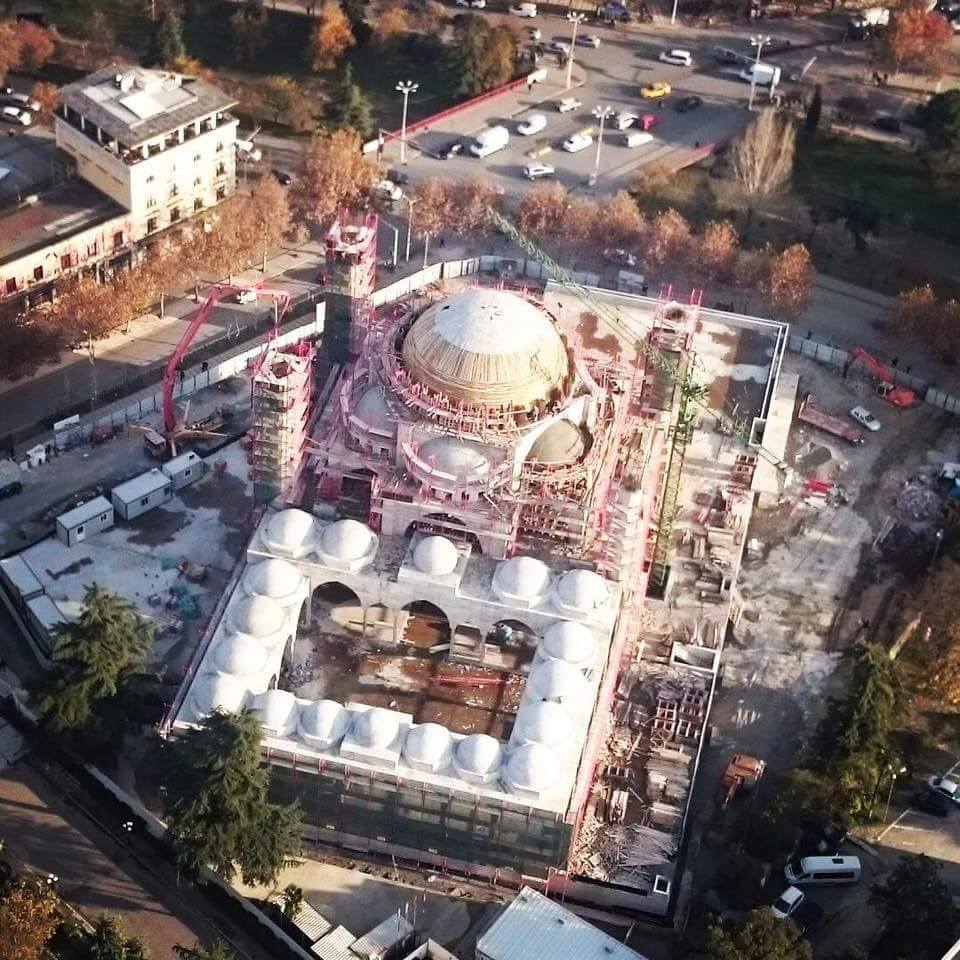
The construction of Namazgja Mosque (Xhamia e Namazgjasë) in Tirana is continuing on schedule, despite a long resistance by many actors. The building will be the biggest Islamic center in the Balkans, including a mosque, a conference room, a library, offices, parking spaces and the museum of cohabitation, the latter considered as a tribute to the religious tolerance in Albania.
The main obstacle for its construction was undoubtedly the legal dispute between the legitimate owners of the land and the Albanian government, resulting in a legal battle of more than a year. In order to facilitate the construction process, the Albanian government had to pay €1.3 million for land expropriation. Other objections were related to the location of the mosque, which is very central location of Tirana, a dense area with tall buildings, as well as commercial and historical edifices. The Albanian Union of Architects and Urban Planners and a group of environmentalist also opposed the location, based on the negative aesthetic, urban, and environmental impact that the mosque would have on the existing landscape of the city.
However, after years of dragging the issue into courts, canceled construction permits and a fierce public debate among actors, the construction of Namazgja Mosque continued, fading in informative darkness and frightening silence.
Exemption from property taxes
Last year, on December 30, 2015, the Municipal Council of Tirana amended the decision “On Local Taxes and Fees in the City of Tirana.” For the first time, the Municipal Council agreed that religious institutions should be excluded from paying property taxes (taksa mbi ndërtesën). Based on this decision, the Namazgja Mosque, located in the most central area of the city of Tirana, up to 6 thousand square meters, with minarets of 35 to 50 meters tall, is exempted from the property taxes.
Property taxes are levied to help paying for public services, such as police and fire brigades, public schools, and utility services. In Albania, the local government heavily relies on public-private partnerships mechanisms to provide them, rather than on a functional taxation system.
In many countries, churches, mosques and other such religious organizations are exempt from paying taxes, despite the fact that they own properties and make profits, just like other types of organizations. Tax exemption (income and property taxes) for religious institutions has been a common practice across the world for generations. In the US, for example, all fifty states give churches a pass on property taxes. However, these practices have been broadly debated and challenged over the years, demanding religious institutions to pay property and income taxes like other entities, such as schools or other educational, cultural, or research institutions. In Albania, not only such debate is completely missing from public sphere, but also the information regarding the topic is almost inexistent. Did you know for example that the government pays more than €800,000 in salaries to the different religious communities in Albania?
Unpaid infrastructural impact taxes
Nonetheless, even when properties owned by religious organizations are completely exempt from paying property taxes, the legislation does not exempt them from the tax on infrastructural impact (taksat e ndikimit në infrastrukturë). According to the law, every new entity under construction should pay this tax, which is calculated on the basis of the amount of investment.
The infrastructural impact tax is supposed to cover for the additional pressure on the Albanian infrastructural system caused by the construction work.
It is unofficially admitted by officials in the Municipality of Tirana that the tax on infrastructural impact for the Mosque of Namazgja has not been paid yet. It is unclear under which conditions the construction of the Mosque continues uninterrupted or how the construction permit was obtained, considering that the payment of the tax is a requirement for both. According to the official site of the architectural firm Hassa, the mosque will be built within three years and requires the amount of €40 million. Considering the fact that the construction of the ,osque falls into the category of “construction entity for public service,” the infrastructural impact tax equals 2 % of the construction amount. Hence, the undue taxes to the Municipality of Tirana amount to about €800,000.
Why are the local authorities of Tirana not collecting their taxes? Both the local and central government of Albania have been responsible for mishandling the issue from the very beginning. The construction of the mosque has gained a lot of political capital and it is of a high cultural importance to the country. Its construction was essential to put to an end the lack of religious facilities for the biggest religious community in Albania. The Muslim community, which makes up for 70% of the population, very often prays in the streets of Tirana, due to lack of space in the existing mosques. For years, the construction of the Mosque has been dragged into numerous conflicts and subsequent Albanian governments have been inept to find a solution to many of the problems raised. In many other cases they have been directly responsible for causing the problems.
More significantly, the start of construction work was inaugurated by the Turkish president Recep Tayyip Erdoğan, considering the mosque as a symbol of good bilateral relations between countries. Moreover, the Turkish Muslim community funded the construction of the mosque and the complex with an amount of €30 million. So it would be almost a heresy for the Albanian government to drag the Muslim community into yet another public dispute related to unpaid taxes, considering also the fact that this can “upset” the Turkish President, nicknamed “brother of the Albanians” by current Prime Minister Edi Rama.

